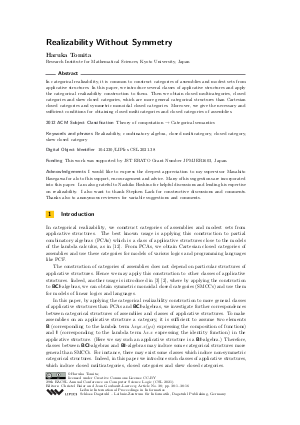Realizability Without Symmetry
Author Haruka Tomita
-
Part of:
Volume:
29th EACSL Annual Conference on Computer Science Logic (CSL 2021)
Part of: Series: Leibniz International Proceedings in Informatics (LIPIcs)
Part of: Conference: Computer Science Logic (CSL) - License:
 Creative Commons Attribution 3.0 Unported license
Creative Commons Attribution 3.0 Unported license
- Publication Date: 2021-01-13
File

PDF
LIPIcs.CSL.2021.38.pdf
- Filesize: 0.49 MB
- 16 pages
Document Identifiers
Subject Classification
ACM Subject Classification
- Theory of computation → Categorical semantics
Keywords
- Realizability
- combinatory algebra
- closed multicategory
- closed category
- skew closed category
Metrics
- Access Statistics
-
Total Accesses (updated on a weekly basis)
0Document
0Metadata
Abstract
In categorical realizability, it is common to construct categories of assemblies and modest sets from applicative structures. In this paper, we introduce several classes of applicative structures and apply the categorical realizability construction to them. Then we obtain closed multicategories, closed categories and skew closed categories, which are more general categorical structures than Cartesian closed categories and symmetric monoidal closed categories. Moreover, we give the necessary and sufficient conditions for obtaining closed multicategories and closed categories of assemblies.
Cite As Get BibTex
Haruka Tomita. Realizability Without Symmetry. In 29th EACSL Annual Conference on Computer Science Logic (CSL 2021). Leibniz International Proceedings in Informatics (LIPIcs), Volume 183, pp. 38:1-38:16, Schloss Dagstuhl – Leibniz-Zentrum für Informatik (2021)
https://doi.org/10.4230/LIPIcs.CSL.2021.38
BibTex
@InProceedings{tomita:LIPIcs.CSL.2021.38,
author = {Tomita, Haruka},
title = {{Realizability Without Symmetry}},
booktitle = {29th EACSL Annual Conference on Computer Science Logic (CSL 2021)},
pages = {38:1--38:16},
series = {Leibniz International Proceedings in Informatics (LIPIcs)},
ISBN = {978-3-95977-175-7},
ISSN = {1868-8969},
year = {2021},
volume = {183},
editor = {Baier, Christel and Goubault-Larrecq, Jean},
publisher = {Schloss Dagstuhl -- Leibniz-Zentrum f{\"u}r Informatik},
address = {Dagstuhl, Germany},
URL = {https://drops.dagstuhl.de/entities/document/10.4230/LIPIcs.CSL.2021.38},
URN = {urn:nbn:de:0030-drops-134729},
doi = {10.4230/LIPIcs.CSL.2021.38},
annote = {Keywords: Realizability, combinatory algebra, closed multicategory, closed category, skew closed category}
}
Author Details
Funding
This work was supported by JST ERATO Grant Number JPMJER1603, Japan.
Acknowledgements
I would like to express the deepest appreciation to my supervisor Masahito Hasegawa for a lot of his support, encouragement and advice. Many of his suggestions are incorporated into this paper. I am also grateful to Naohiko Hoshino for helpful discussions and lending his expertise on realizability. I also want to thank Stephen Lack for constructive discussions and comments. Thanks also to anonymous reviewers for variable suggestions and comments.
References
-
Samson Abramsky. Temperley-lieb algebra: from knot theory to logic and computation via quantum mechanics. arXiv preprint arXiv:0910.2737, 2009.

-
Samson Abramsky, Esfandiar Haghverdi, and Philip Scott. Geometry of interaction and linear combinatory algebras. Mathematical Structures in Computer Science, 12(5):625-665, 2002.

-
Samson Abramsky and Marina Lenisa. A fully complete PER model for ML polymorphic types. In International Workshop on Computer Science Logic, pages 140-155. Springer, 2000.

-
Valeria de Paiva and Harley Eades. Dialectica categories for the lambek calculus. In International Symposium on Logical Foundations of Computer Science, pages 256-272. Springer, 2018.

-
Samuel Eilenberg and G Max Kelly. Closed categories. In Proceedings of the Conference on Categorical Algebra, pages 421-562. Springer, 1966.

-
Masahito Hasegawa. A quantum double construction in Rel. Mathematical Structures in Computer Science, 22(4):618-650, 2012.

-
J Roger Hindley and Jonathan P Seldin. Lambda-calculus and Combinators, an Introduction, volume 13. Cambridge University Press Cambridge, 2008.

-
Naohiko Hoshino. Linear realizability. In International Workshop on Computer Science Logic, pages 420-434. Springer, 2007.

-
Jiaming Jiang, Harley Eades III, and Valeria de Paiva. On the lambek calculus with an exchange modality. arXiv preprint arXiv:1904.06847, 2019.

-
Yuichi Komori. Syntactical investigations into BI logic and BB'I logic. Studia Logica, 53(3):397-416, 1994.

-
Joachim Lambek. Deductive systems and categories II. standard constructions and closed categories. In Category theory, homology theory and their applications I, pages 76-122. Springer, 1969.

-
John R Longley. Realizability toposes and language semantics. PhD thesis, University of Edinburgh, 1995.

-
Oleksandr Manzyuk. Closed categories vs. closed multicategories. Theory and Applications of Categories, 26(5):132-175, 2012.

-
Eugenio Moggi. Computational lambda-calculus and monads. Technical report ECS-LFCS-88-66, University of Edinburgh, 1988.

-
Amr Sabry. Note on axiomatizing the semantics of control operators. Technical report CIS-TR-96-03, Department of Computer Science, University of Oregon, 1996.

-
Amr Sabry and Matthias Felleisen. Reasoning about programs in continuation-passing style. Lisp and symbolic computation, 6(3-4):289-360, 1993.

-
Ross Street. Skew-closed categories. Journal of Pure and Applied Algebra, 217(6):973-988, 2013.

-
Kornel Szlachányi. Skew-monoidal categories and bialgebroids. Advances in Mathematics, 231(3-4):1694-1730, 2012.

-
Noam Zeilberger. A theory of linear typings as flows on 3-valent graphs. In Proceedings of the 33rd Annual ACM/IEEE Symposium on Logic in Computer Science, pages 919-928. ACM, 2018.

-
Noam Zeilberger and Alain Giorgetti. A correspondence between rooted planar maps and normal plain lambda terms. Logical Methods in Computer Science, 11(3):1-39, 2015.

